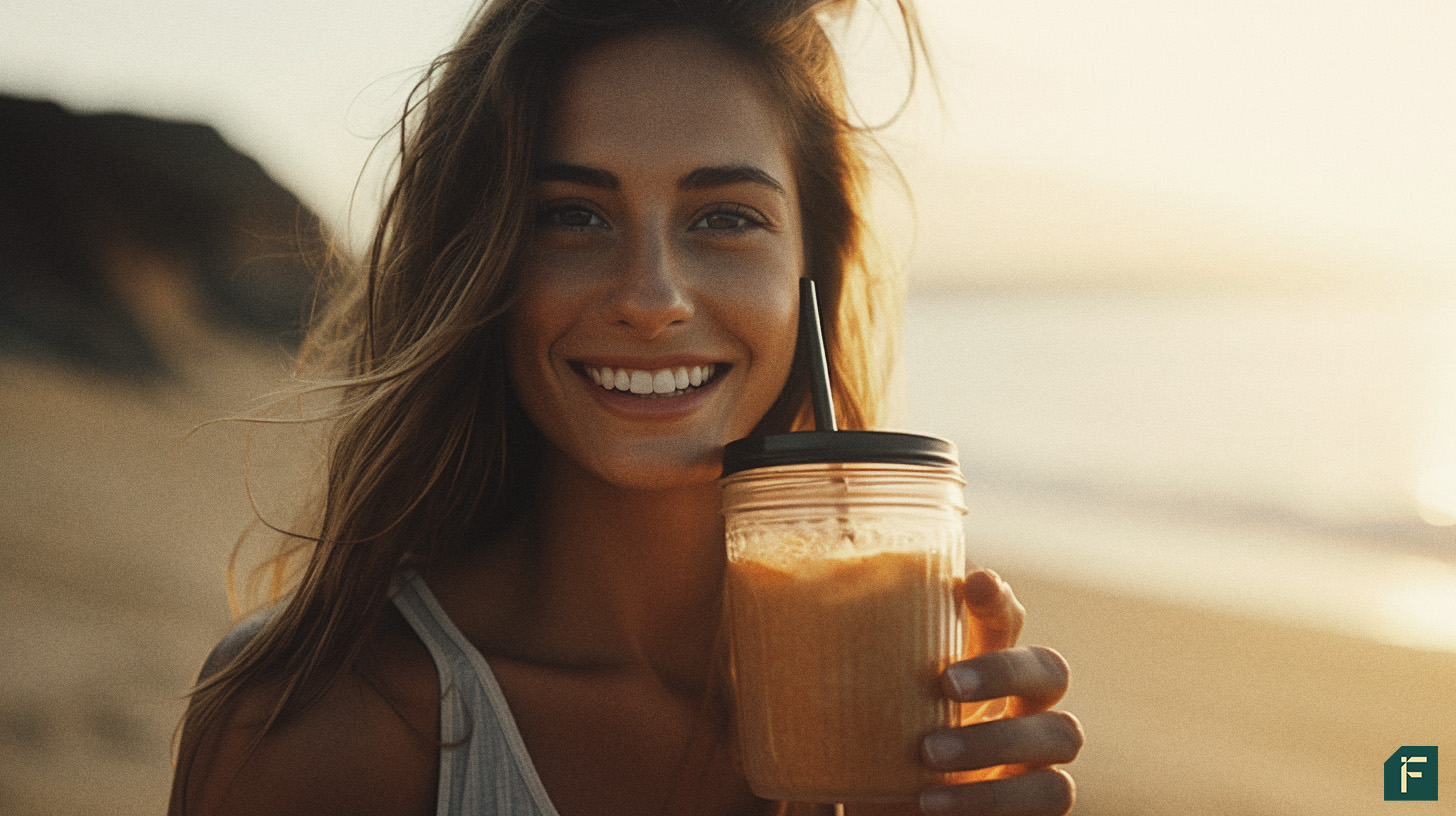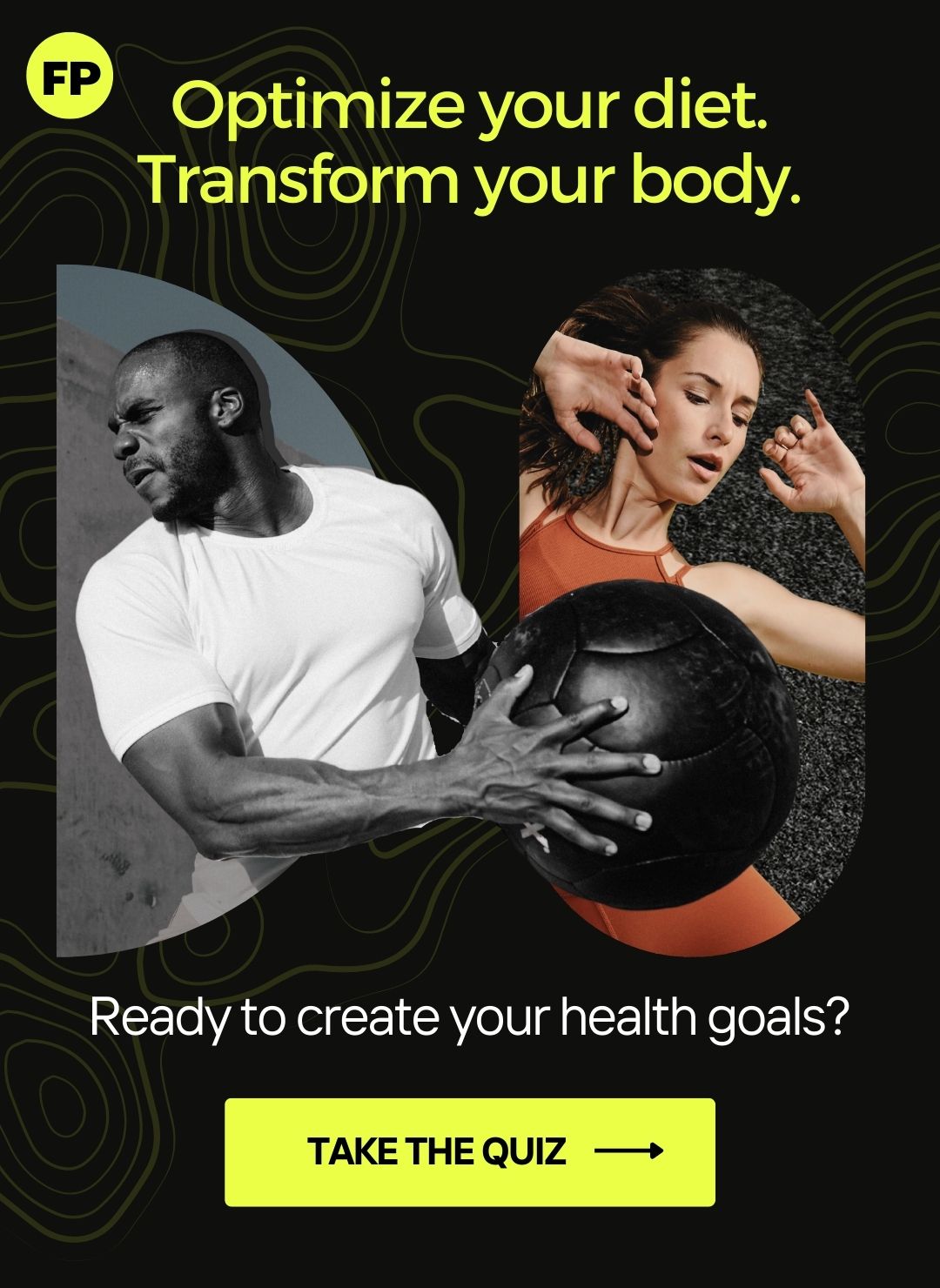If you are following a vegan diet and aiming to build muscle, it’s crucial to ensure adequate protein intake. Fortunately, numerous vegan foods offer fuel suitable for muscle enhancement. In this section, we’ll delve into the top plant-based options to assist you in reaching your fitness aspirations.
Takeaways:
-
- Cook quinoa according to package instructions
- Preheat oven to 400°F
- Combine chopped veggies with olive oil, salt, and pepper in a large bowl
- Spread veggies on a baking sheet and roast for 20-25 minutes until tender
- In a small bowl, whisk together tahini, lemon juice, garlic, and seasonings.
- Combine quinoa, chickpeas, spinach, and dressing in a large bowl
- Toss salad with the desired amount of dressing.
- Serve immediately or refrigerate and enjoy later!
Nuts and Seeds – Protein All-Stars
Nuts and seeds offer an easy way to add plant-based protein to meals and snacks.
Peep this:
- BCAAs – Nuts and seeds provide amino acids like leucine, valine and others. Just 2 Tbsp of almond butter provides 8g of protein.
- Calories – The high-fat content makes nuts and seeds more calorie-dense. This supports energy needs in active individuals.
- Portability – Nut butters, roasted nuts/seeds, and seed bars – all make on-the-go protein snacks!
- Healthy Fats – Nuts and seeds provide healthy mono- and polyunsaturated fats to support hormonal balance for gains. Big deal.
Some of the best nuts and seeds for body transformation include:
| Nuts | Protein per 1 oz |
|---|---|
| Almonds | 6g |
| Cashews | 5g |
| Pistachios | 6g |
| Seeds | Protein per 1 oz |
|---|---|
| Chia seeds | 4g |
| Hemp seeds | 9g |
| Pumpkin seeds | 5g |
Not only are nuts and seeds a convenient snack but they can also be used to add crunch and flavor to meals. Sprinkle chopped nuts over a salad, or add seeds to your morning smoothie for an extra protein boost.
Almond butter, peanut butter, and tahini (made from sesame seeds) are all great options that can add a rich and creamy texture to your meals.
Aim for a 1-2 ounce handful or 2 Tbsp nut butter daily for an easy protein (and health) boost!
Protein Powders – Meet Your Daily Needs with Ease
For those struggling to eat enough whole food protein, adding plant-derived protein powder can help you meet daily protein needs for physique enhancement. But with so many options available, choosing the right plant-based protein powder can be overwhelming. Here are some of the best plant-based protein powders for muscle building:
- Pea protein – Pea protein has an amino acid profile similar to whey. Studies show it boosts muscle thickness comparable to whey protein. It’s easily digested too!
- Hemp protein – Hemp protein provides amino acids, protein, and healthy fats in an easily digestible form. The omega-3s support recovery.
- Rice protein – Easy to digest rice protein provides muscle-building amino acids. Rice protein can be safely consumed by those with allergies.
- Soy protein – With all essential amino acids, soy is a complete protein equal to animal sources for supporting your body once protein intake is sufficient. Yaas!
| Protein Powder | Protein Content (per serving) | Source |
| Pea Protein | 20-25 grams | Yellow Peas |
| Brown Rice Protein | 20-25 grams | Brown Rice |
| Hemp Protein | 10-15 grams | Hemp Seeds |
| Soy Protein | 20-25 grams | Soybeans |
When choosing a plant-based protein powder, look for high-quality organic sources without excess sugars or artificial ingredients. Also, consider the flavor and texture of the powder, as it can vary from brand to brand.
Vegan Recipes for Serious Gains
Incorporating more high-protein vegan foods and recipes in your meal plan is key for meeting needs. Here are some hearty, protein-packed vegan recipes for physique:
1. Vegan Tofu Stir-Fry
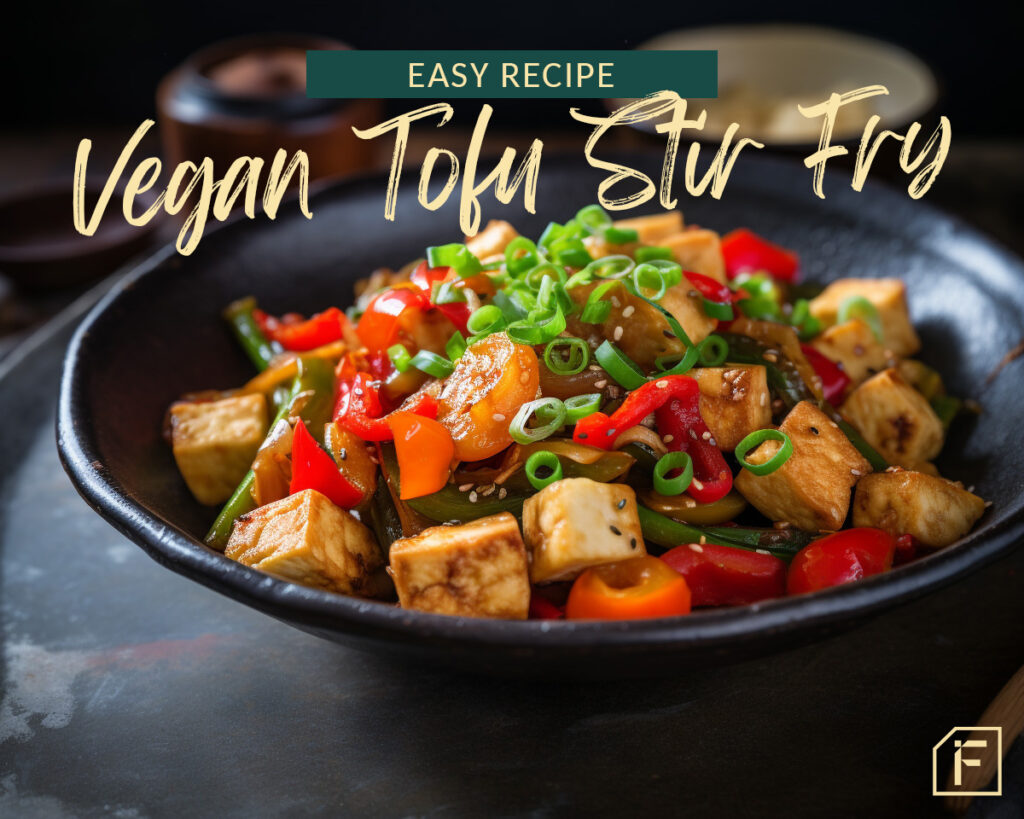
Ingredients:
-
- 1 lb extra firm tofu, drained, pressed, and cubed
- 2 cups mixed vegetables (broccoli, bell pepper, mushrooms, etc.)
- 1 red bell pepper, sliced
- 2 tbsp. Low-sodium soy sauce
- 1 tbsp. cornstarch
- 1 tbsp. sesame oil
- 1 tsp. freshly grated ginger
- 1 tsp. garlic, minced
- Salt and pepper to taste
- 2 Tbsp olive oil
Instructions:
-
- Cut tofu into cubes and season with salt and pepper.
- In a small bowl, whisk together soy sauce and cornstarch.
- Heat sesame oil in a skillet over medium-high heat.
- Add tofu and cook for 5-7 minutes, until golden brown.
- Remove tofu from the skillet and set aside.
- Add vegetables to skillet and cook for 3-4 minutes.
- Add ginger and garlic to skillet and cook for 1-2 minutes.
- Add tofu back to skillet and pour soy sauce mixture over the top.
- Cook for an additional 2-3 minutes, until sauce has thickened.
- Serve over quinoa or brown rice and enjoy!
Makes 2 servings. 19 g protein per serving.
2. Lentil Walnut Burgers
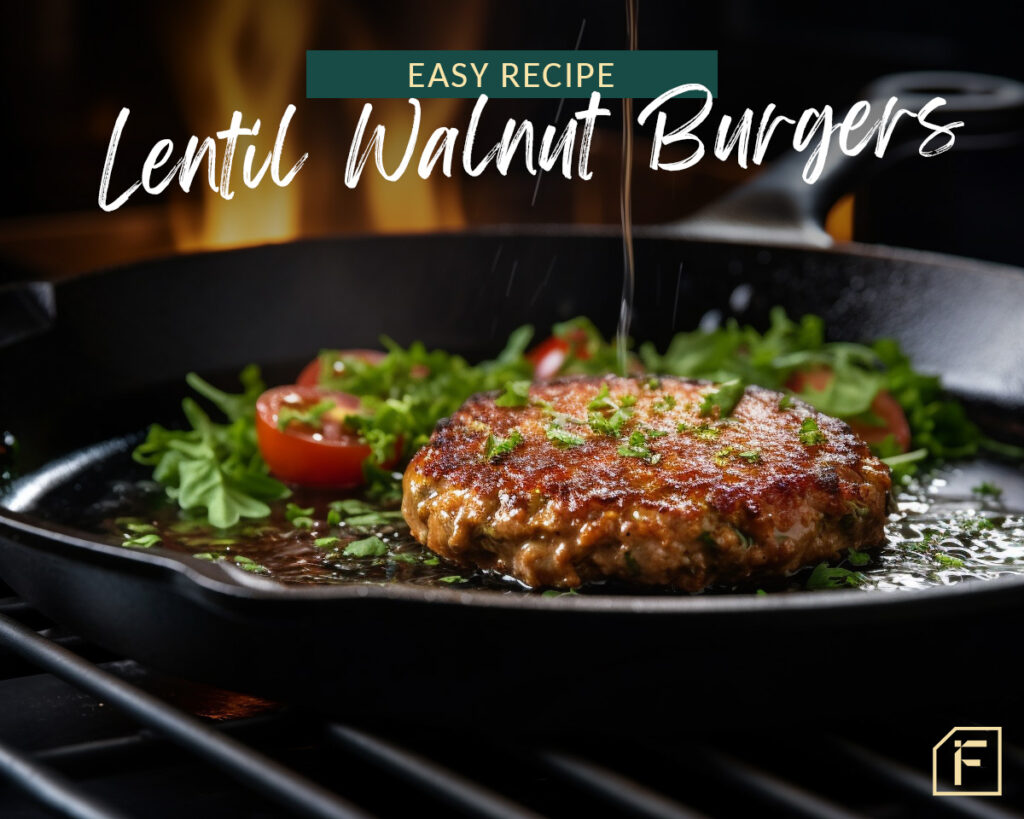
Lentil Walnut Burgers -
Ingredients:
-
- 2 cups cooked green lentils, mashed
- 1 cup cooked quinoa or rolled oats
- 1/2 cup breadcrumbs
- 1/4 cup walnuts
- 1/4 cup diced onion
- 1/4 cup diced bell pepper
- 2 tbsp. flaxseed meal
- 2 tbsp. olive oil
- 1 Tbsp soy sauce
- 1/2 tsp each: garlic powder, cumin, oregano
- 1 tsp. paprika
- Salt and pepper to taste
Instructions:
-
- In a large bowl, combine all ingredients and mix well.
- Form mixture into patties.
- Bake at 350°F for 20 minutes, flipping halfway until golden brown.
- Serve on a whole-grain bun with your favorite toppings.
Makes 4 patties. 8 g protein each.
3. Protein-Packed Vegan Smoothie
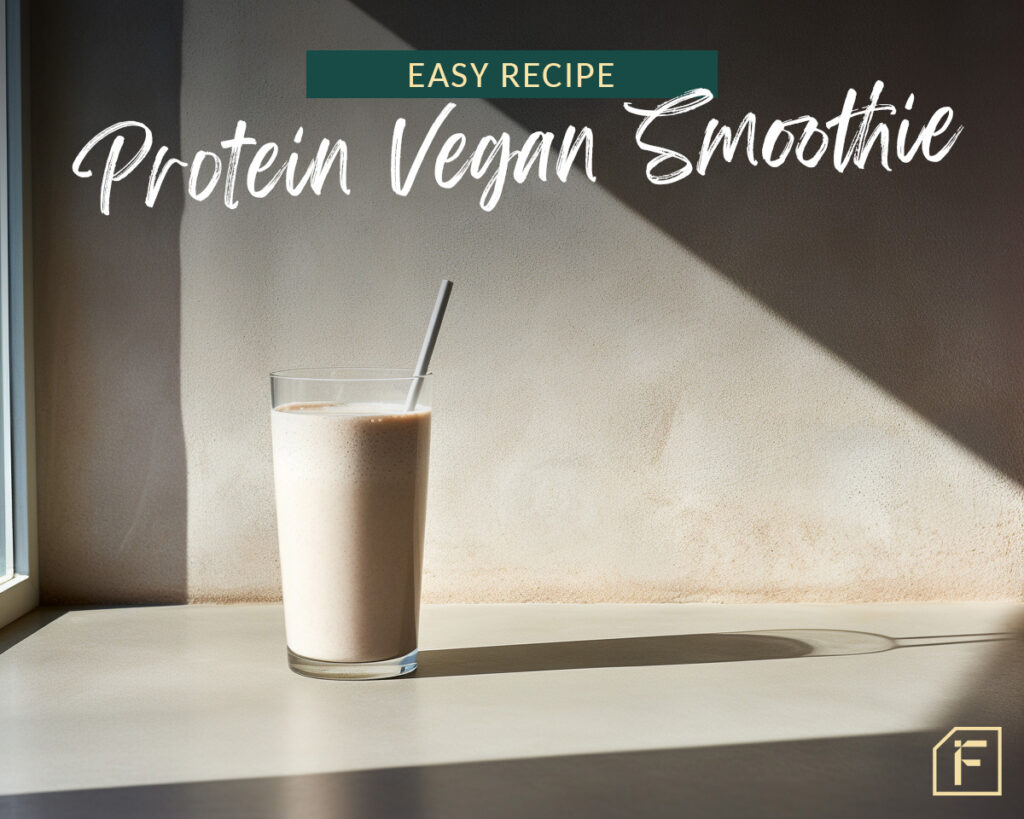
Protein Vegan Smoothie Ingredients:
-
- 1 banana or avocado
- 1/2 cup frozen berries (or fruit of choice)
- 1/2 cup silken tofu
- 1/2 cup oat or coconut milk
- 2 Tbsp almond butter
- 1 tbsp. chia seeds
- 1 cup spinach
- 1 scoop pea protein powder
- 1 tbsp. honey or maple syrup (optional)
- 1 cup ice (optional)
Instructions:
Blend until smooth. Amounts may be adjusted based on personal macros.
This smoothie provides about 24 g protein.
These high-protein vegan recipes are perfect for fitness and can help you reach your fitness goals while enjoying delicious and nutritious meals. Experiment with different ingredients and flavors to find the recipes that work best for you and your lifestyle.
Meal Prep Tips for Vegan Body Transformation
To successfully build muscle on a vegan diet, strategic meal planning is key.
Here are some meal-planning tips to help support your plant-based muscle growth goals:
-
- Eat protein foods at each meal including beans, lentils, tofu/tempeh, quinoa, nuts. Have a protein shake when intake is low.
- Have ~20-30 g protein at each meal to maximize strength-building nutrients all day.
- Time protein intake pre- and post-workout to support muscle repair and growth.
- Pair proteins like rice and beans or hummus on Ezekiel toast for a complete protein.
- Meal prep dishes like vegan chili, curries, and burrito bowls high in protein for quick meals.
- Snack on nuts, nut butter, edamame, or nut protein bars to help meet needs.
- Use a food-tracking app to ensure you get sufficient protein and calories for your goals.
Meeting protein needs consistently is key for fueling intense training and supporting continual muscle growth.
Vegan Supplements for Muscle-Building Goals
While a balanced plant-based diet can provide you with all the nutrients you need for your physique, vegan supplements can be an excellent addition to your routine. These supplements can help maximize your gains, enhance your recovery, and meet your daily protein requirements. Here are some of the best vegan supplements for muscle building.
Plant-Based Protein Powders
Protein powders are an easy and convenient way to increase your protein intake. They can be mixed into smoothies, oatmeal, or simply blended with water for a quick post-workout shake. Some of the most popular powders include:
Protein Powder Protein Content per Serving Pea Protein 20-25 grams Hemp Protein 10-15 grams Brown Rice Protein 20-25 grams As discussed, choose a high-quality plant-based protein powder to supplement whole food intake when needed. You may also want to choose a protein powder that is fortified with additional nutrients like vitamins and minerals.
Branched-Chain Amino Acids (BCAAs)
Vegan-friendly BCAA supplements provide leucine and other amino acids to maximize muscle protein synthesis. These sources of BCAAs include soybeans, quinoa, and lentils. However, if you prefer a supplement form, check out vegan BCAA powders or capsules that are derived from plant sources.
Creatine
Creatine is a popular supplement among athletes and bodybuilders that can increase muscle mass, strength, and endurance. While creatine is commonly found in animal products, vegan creatine supplements are also available and are derived from sources like fermented beets and yeast.
Overall, supplements should never replace a balanced diet, and it’s essential to consult with a healthcare practitioner before adding any new supplements to ensure safety and proper dosage.
Wrap Up
There you have it – the top bean protein sources and tips to effectively build lean muscle on a plant-based diet! With enough protein from whole foods and supplements, you can totally build strong muscle 100% vegan style.
Strategic meal planning and tracking intake helps ensure you get enough protein consistently to fuel your workouts and optimize muscle growth. Supplementing with bean protein powder and other supplements can provide additional support when needed.
While individual protein needs vary, aim for 0.5-0.8 g of protein per pound of body weight and at least 20 g per meal to maximize muscle protein production. Meal prep, track intake, and leverage protein powders when needed.
Building impressive vegan muscle takes work to nail your nutrition plan. But with commitment to protein-packed foods, strategic meal prepping, and intense training, you’ll be toned in no time. Now get pumped and build that vegan muscle!
FAQ
How do vegan bodybuilders get enough protein to build muscle?
Vegan bodybuilders use a combination of high-protein whole foods like beans, tofu, quinoa along with grain protein powders like pea and rice protein to help meet higher protein needs from intense training. Meal prepping and tracking intake helps ensure they get enough protein consistently.
What are complete proteins for vegans?
Complete protein foods contain all nine essential amino acids required to build muscle. Good vegan choices include soy, quinoa, buckwheat, Ezekiel bread, chia seeds, hemp seeds and mycoprotein. Pairing rice and beans also provides complete protein.
How can I build muscle fast on a vegan diet?
Building muscle fast requires intense strength training, eating sufficient protein (~0.7-1g per pound of body weight daily), eating in a calorie surplus, and avoiding energy deficits that break down muscle. Strategies like carb cycling may help maximize growth. Rest is important too!
Can you build muscle by eating only plants?
Yes, it’s absolutely possible to build muscle effectively on a vegan diet by eating only plant-based whole foods. Key plant protein sources like beans, lentils, tofu, tempeh, nuts, seeds, quinoa, and leafy greens provide all the essential amino acids you need for muscle building when calorie intake is sufficient.
Is rice and beans a complete protein?
Yes, pairing rice and beans together creates a complete protein as the amino acid profile of each complements the other. For maximum muscle-building benefits, have ~1 cup of beans with 1/2 cup of rice to get all essential amino acids.
- Getting enough protein is crucial for growing lean muscle on a vegan diet. Shoot for 0.5-0.8 grams per pound of body weight daily.
- Great vegan protein sources include beans, lentils, tempeh, tofu, seitan, quinoa, nuts, seeds, and vegan protein powder to fuel those gains!
- Vegan diets can build muscle and strength the same as other diets when protein intake is on point.
- Meal prepping, tracking macros, and vegan supplements can help meet your needs. Big facts.
- Chatting with a dietitian will make sure your muscle meals are nutritionally complete.
Why a Plant-Based Diet is Great for Building Muscle
Some people wonder if you can build muscle effectively following a vegan diet. Rest assured, with proper nutrition, vegans can gain muscle and strength as successfully as those who eat animal products. Here’s why a plant-based diet supports muscle growth:
- Protein – Vegan protein sources like beans, tofu, and tempeh provide all the essential amino acids needed to build muscle protein. Plant protein is just as effective as animal protein for fortifying your body.
- Low Fat – A vegan diet is naturally lower in unhealthy saturated fat. Excess fat can impede the formation of muscle tissue, so a vegan diet’s lean protein is ideal.
- Nutrient Density – Plant foods offer a wealth of vitamins, minerals, and antioxidants that support muscle repair and growth.
- Anti-Inflammatory – The anti-inflammatory nature of plant foods aids muscle recovery. Animal products often promote inflammation which can inhibit gains.
With proper nutrition, those following plant-based diets can gain muscle effectively. Next, let’s compare plant and whey protein for building muscle.
Plant-Based Diet vs. Whey
Whey protein has long been considered the gold standard for improving muscle tone. But research shows plant proteins are just as effective for supporting muscle protein synthesis.
- Plant-based protein powders like pea, hemp, and rice protein offer comparable amino acid profiles to whey, to stimulate muscle growth. It’s just as legit as animal sources.
- Studies demonstrate soy and pea protein match whey’s muscle-building effects when protein intake is equated.
- Plant proteins provide additional nutrients like fiber, vitamins, and minerals lacking in whey.
- Vegan protein powders can aid post-workout recovery and muscle repair.
So, if you’re looking to build muscle on a vegan diet, rest assured that it’s entirely possible. By incorporating a variety of plant-based protein sources into your daily nutrition, you can achieve your muscle gain goals while enjoying the many other benefits of a compassionate and sustainable lifestyle.
How Much Protein for Muscle Growth – Vegan-Style?
To build muscle as a vegan, comprehending your fuel needs is pivotal. Protein is indispensable for muscle development and mending, with athletes and fitness aficionados needing more than the typical individual.
Exactly how much protein do you need to build muscle on a vegan diet? While needs vary, aim for:
- 0.5-0.8 grams of protein per pound of body weight – For building muscle, consuming 0.5-0.8 g/lb, or 1.1-1.8 g/kg is ideal for most. Spread intake throughout the day.
- 20-30 grams of protein per meal – Eat 20-30 g of protein per meal to maximize performance-enhancing production. Go higher if you weigh more.
- Protein at every meal – Include quality plant-derived protein sources at each meal and snack to stimulate muscle growth all day.
It’s also important to note that not all protein sources are created equal. For optimal muscle growth, it’s important to consume high-quality protein sources that provide all nine essential amino acids.
When planning your vegan muscle-building diet, focus on incorporating a variety of whole foods that are naturally high in protein.
Let’s look at some top whole food vegan dietary sources and their protein per serving:
- Tempeh: 15 g protein per 3 ounces
- Tofu: 10 g per 1/2 cup
- Lentils: 9 g per 1/2 cup
- Beans: 7-10 g per 1/2 cup
- Seitan: 21 g per 3 ounces
- Edamame: 8 g per 1/2 cup
- Quinoa: 4 g per 1/2 cup
- Peanut butter: 8 g per 2 Tbsp
While whole foods should provide most of your daily protein, powders can supplement intake when needed.
If you’re having trouble meeting your protein requirements through whole foods alone, you may also want to consider adding a plant-based protein powder to your diet. Look for options that are made from high-quality ingredients like pea protein, hemp protein, and brown rice protein.
But first, let’s talk essential amino acids…
Amino Acids 101 for Vegan Muscle Building
Your body requires 20 different amino acids to build cell-renewing elements. There are nine essential amino acids that your body needs to build muscle. To ensure optimal muscle growth and recovery, you must consume enough of these amino acids in your diet. They are considered “essential” meaning you must get them from your diet. Here are the nine essential amino acids and quality vegan food sources loaded with each:
- Leucine – soybeans, pumpkin seeds, lentils, peanuts
- Isoleucine – soy protein, cashews, chickpeas, lentils
- Valine – tempeh, oats, peanuts, lentils
- Lysine – beans, lentils, quinoa, pistachios
- Methionine – Brazil nuts, oats, cashews, pine nuts
- Phenylalanine – pumpkin seeds, rice, beans, nuts
- Threonine – leafy greens, beans, seitan, soybeans
- Tryptophan – oats, lentils, seeds, beans
- Histidine – soybeans, lentils, grains, nuts
These are the building blocks of protein, and your body needs them to build and repair muscle tissue after workouts.
Fortunately, there are several plant-based sources of all nine essential amino acids. One excellent option is quinoa, which is a complete protein that contains all EAAs. Other plant-based protein sources that provide all the EAAs include soybeans, chia seeds, hemp seeds, and spirulina.
Consuming a variety of these plant foods provides all the amino acids your muscles need to thrive and grow.
The Role of BCAAs in Increasing Muscle Tone
Branched-chain amino acids (BCAAs), encompassing leucine, isoleucine, and valine, are a segment of the EAAs and play a pivotal role in muscle development and recuperation.
They include leucine, isoleucine, and valine. Here’s why they’re so clutch:
- Stimulate Muscle Growth – BCAAs directly activate lean body compounds. Leucine is crucial.
- Prevent Muscle Breakdown – BCAAs decrease muscle nutrient breakdown during exercise.
- Speed Recovery – BCAAs reduce exercise-induced muscle damage and promote repair after training.
- Increased strength – Supplementing BCAAs can boost strength gains from resistance training.
While many animal-based protein sources like whey protein are high in BCAAs, there are also several plant-based options. Soybeans, lentils, chickpeas, and quinoa are all excellent sources of BCAAs.
Though BCAA supplements can benefit in developing muscle mass, you can also get them from soy, peanuts, lentils, whole grains and other vegan staples. A varied plant-based diet delivers a solid BCAA boost!
Beans and Legumes – Protein Powerhouses
Beans and legumes like lentils, chickpeas, and black beans are amazing vegan dietary sources. These nutrient-dense foods are naturally low in fat, high in fiber, and loaded with vitamins and minerals that support muscle growth and repair. Here’s how they benefit growing lean muscles:
- High in protein – 1 cup of cooked beans provides ~15 g of protein. Lentils contain 18 g per cooked cup.
- Muscle-building amino acids – Beans provide good doses of leucine to stimulate muscle-boosting production.
- Low calories – With lots of protein and fiber but minimal fat, beans are low-calorie protein powerhouses.
- Nutrient support – Minerals like iron support oxygen delivery to muscles. Magnesium aids protein synthesis.
- Satiety – The protein and fiber in beans increase satiety, preventing muscle-wasting hunger.
Chickpeas are another great option, with 14.5 grams of protein and 12.5 grams of fiber per cup. Black beans, kidney beans, and navy beans also provide a healthy dose of protein, fiber, and other essential nutrients.
Not only are beans and legumes versatile in the kitchen, but they are also affordable and easy to find in grocery stores or online. You can add them to salads, soups, stews, and even burgers to increase your protein intake.
Aim to eat beans or lentils daily to maximize them muscle gains! Chili, hummus, tacos – the options are endless!
Vegan Protein Powders – Level Up Your Protein Game
If you’re looking for a more convenient way to boost your protein intake, protein powders are an excellent option. There are many options available, including pea, hemp, and brown rice, that are rich in amino acids and easy to digest. Here are some top plant-based protein options for vegan body sculpting:
- Pea protein – Pea protein has an amino acid profile similar to whey protein. It’s easy to digest and absorbs well. Pea protein boosts muscle thickness after training.
- Soy protein – Soy is a complete protein with all essential amino acids. Studies show it equals whey for supporting lean muscle mass when intake is adequate!
- Hemp protein – Though lower in leucine, hemp contains balanced essential amino acids for physical progress. With its healthy fats, hemp supports hormone balance.
- Rice protein – Hypoallergenic rice protein provides amino acids to stimulate muscle growth. Plus it’s super gentle on your stomach.
When choosing a plant-based protein powder, look for organic options without excess sugar. Steer clear of artificial stuff too!
Quinoa and Whole Grains – Quality Carbs to Fuel Your Workouts
Whole grains like quinoa, brown rice, and oats provide an excellent carb source to fuel workouts and daily activity. Here’s how they support physique:
- Complete protein – Quinoa contains all nine essential amino acids, offering a vegetarian-friendly complete protein.
- High in protein – Quinoa provides 8 g protein per cooked cup. Amaranth has 9 g and buckwheat 6 g per cup.
- Complex carbs – The fiber in whole grains provides sustained energy release. Oats fuel your workouts and aid recovery.
- Magnesium – Whole grains provide magnesium which supports physique-enhancement and active recovery.
Whole grains like quinoa, brown rice, and oats are versatile and flavorful vegan sources of protein that can help build muscle on a plant-based diet.
Enjoy quinoa in salads, stirred into soups, as porridge, or as a nutrient-packed side dish. For example, this high-protein vegan quinoa salad provides 28 g protein:
Protein-Powered Quinoa Tahini Salad Recipe
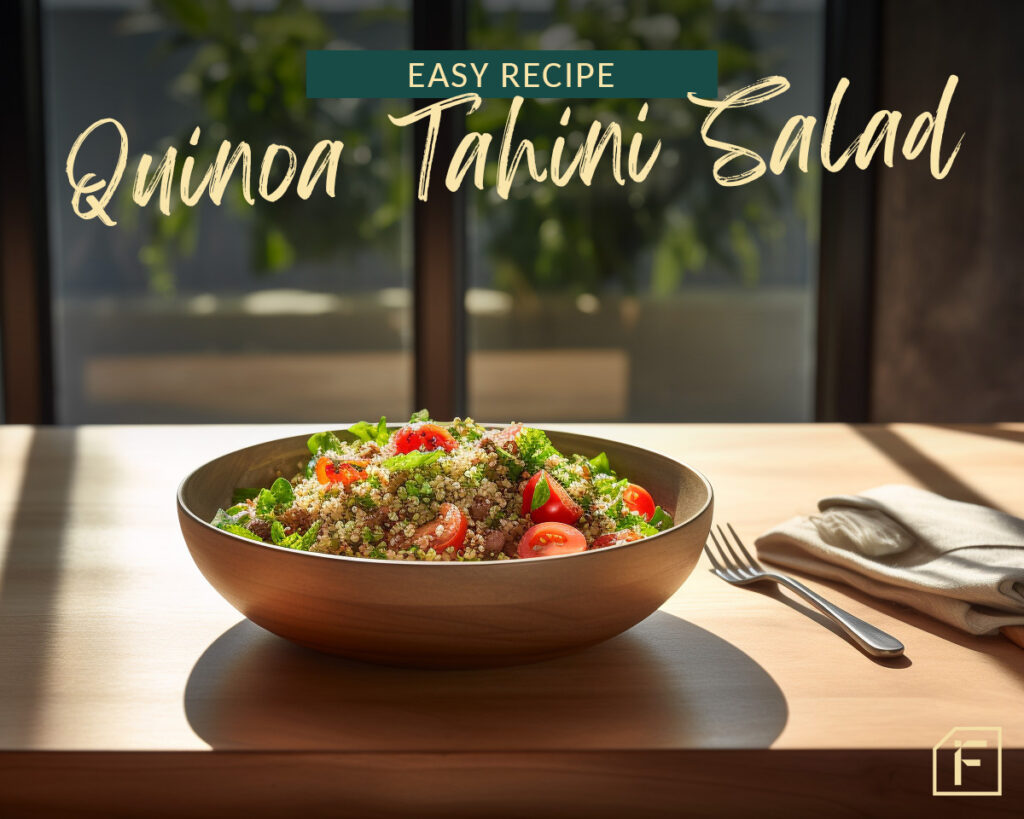
Quinoa Tahini Salad Ingredients:
- 1/2 cup quinoa, cooked
- 1 can chickpeas, rinsed and drained
- 1 cup spinach
- 2 Tbsp tahini
- 2 Tbsp lemon juice
- 1 clove garlic, minced
- Salt and pepper to taste
-
- Cook quinoa according to package instructions
- Preheat oven to 400°F
- Combine chopped veggies with olive oil, salt, and pepper in a large bowl
- Spread veggies on a baking sheet and roast for 20-25 minutes until tender
- In a small bowl, whisk together tahini, lemon juice, garlic, and seasonings.
- Combine quinoa, chickpeas, spinach, and dressing in a large bowl
- Toss salad with the desired amount of dressing.
- Serve immediately or refrigerate and enjoy later!
- BCAAs – Nuts and seeds provide amino acids like leucine, valine and others. Just 2 Tbsp of almond butter provides 8g of protein.
- Calories – The high-fat content makes nuts and seeds more calorie-dense. This supports energy needs in active individuals.
- Portability – Nut butters, roasted nuts/seeds, and seed bars – all make on-the-go protein snacks!
- Healthy Fats – Nuts and seeds provide healthy mono- and polyunsaturated fats to support hormonal balance for gains. Big deal.
- Pea protein – Pea protein has an amino acid profile similar to whey. Studies show it boosts muscle thickness comparable to whey protein. It’s easily digested too!
- Hemp protein – Hemp protein provides amino acids, protein, and healthy fats in an easily digestible form. The omega-3s support recovery.
- Rice protein – Easy to digest rice protein provides muscle-building amino acids. Rice protein can be safely consumed by those with allergies.
- Soy protein – With all essential amino acids, soy is a complete protein equal to animal sources for supporting your body once protein intake is sufficient. Yaas!
-
- 1 lb extra firm tofu, drained, pressed, and cubed
- 2 cups mixed vegetables (broccoli, bell pepper, mushrooms, etc.)
- 1 red bell pepper, sliced
- 2 tbsp. Low-sodium soy sauce
- 1 tbsp. cornstarch
- 1 tbsp. sesame oil
- 1 tsp. freshly grated ginger
- 1 tsp. garlic, minced
- Salt and pepper to taste
- 2 Tbsp olive oil
Instructions:
-
- Cut tofu into cubes and season with salt and pepper.
- In a small bowl, whisk together soy sauce and cornstarch.
- Heat sesame oil in a skillet over medium-high heat.
- Add tofu and cook for 5-7 minutes, until golden brown.
- Remove tofu from the skillet and set aside.
- Add vegetables to skillet and cook for 3-4 minutes.
- Add ginger and garlic to skillet and cook for 1-2 minutes.
- Add tofu back to skillet and pour soy sauce mixture over the top.
- Cook for an additional 2-3 minutes, until sauce has thickened.
- Serve over quinoa or brown rice and enjoy!
Makes 2 servings. 19 g protein per serving.
2. Lentil Walnut Burgers

Lentil Walnut Burgers -
Ingredients:
-
- 2 cups cooked green lentils, mashed
- 1 cup cooked quinoa or rolled oats
- 1/2 cup breadcrumbs
- 1/4 cup walnuts
- 1/4 cup diced onion
- 1/4 cup diced bell pepper
- 2 tbsp. flaxseed meal
- 2 tbsp. olive oil
- 1 Tbsp soy sauce
- 1/2 tsp each: garlic powder, cumin, oregano
- 1 tsp. paprika
- Salt and pepper to taste
Instructions:
-
- In a large bowl, combine all ingredients and mix well.
- Form mixture into patties.
- Bake at 350°F for 20 minutes, flipping halfway until golden brown.
- Serve on a whole-grain bun with your favorite toppings.
Makes 4 patties. 8 g protein each.
3. Protein-Packed Vegan Smoothie

Protein Vegan Smoothie Ingredients:
-
- 1 banana or avocado
- 1/2 cup frozen berries (or fruit of choice)
- 1/2 cup silken tofu
- 1/2 cup oat or coconut milk
- 2 Tbsp almond butter
- 1 tbsp. chia seeds
- 1 cup spinach
- 1 scoop pea protein powder
- 1 tbsp. honey or maple syrup (optional)
- 1 cup ice (optional)
Instructions:
Blend until smooth. Amounts may be adjusted based on personal macros.
This smoothie provides about 24 g protein.
These high-protein vegan recipes are perfect for fitness and can help you reach your fitness goals while enjoying delicious and nutritious meals. Experiment with different ingredients and flavors to find the recipes that work best for you and your lifestyle.
Meal Prep Tips for Vegan Body Transformation
To successfully build muscle on a vegan diet, strategic meal planning is key.
Here are some meal-planning tips to help support your plant-based muscle growth goals:
-
- Eat protein foods at each meal including beans, lentils, tofu/tempeh, quinoa, nuts. Have a protein shake when intake is low.
- Have ~20-30 g protein at each meal to maximize strength-building nutrients all day.
- Time protein intake pre- and post-workout to support muscle repair and growth.
- Pair proteins like rice and beans or hummus on Ezekiel toast for a complete protein.
- Meal prep dishes like vegan chili, curries, and burrito bowls high in protein for quick meals.
- Snack on nuts, nut butter, edamame, or nut protein bars to help meet needs.
- Use a food-tracking app to ensure you get sufficient protein and calories for your goals.
Meeting protein needs consistently is key for fueling intense training and supporting continual muscle growth.
Vegan Supplements for Muscle-Building Goals
While a balanced plant-based diet can provide you with all the nutrients you need for your physique, vegan supplements can be an excellent addition to your routine. These supplements can help maximize your gains, enhance your recovery, and meet your daily protein requirements. Here are some of the best vegan supplements for muscle building.
Plant-Based Protein Powders
Protein powders are an easy and convenient way to increase your protein intake. They can be mixed into smoothies, oatmeal, or simply blended with water for a quick post-workout shake. Some of the most popular powders include:
Protein Powder Protein Content per Serving Pea Protein 20-25 grams Hemp Protein 10-15 grams Brown Rice Protein 20-25 grams As discussed, choose a high-quality plant-based protein powder to supplement whole food intake when needed. You may also want to choose a protein powder that is fortified with additional nutrients like vitamins and minerals.
Branched-Chain Amino Acids (BCAAs)
Vegan-friendly BCAA supplements provide leucine and other amino acids to maximize muscle protein synthesis. These sources of BCAAs include soybeans, quinoa, and lentils. However, if you prefer a supplement form, check out vegan BCAA powders or capsules that are derived from plant sources.
Creatine
Creatine is a popular supplement among athletes and bodybuilders that can increase muscle mass, strength, and endurance. While creatine is commonly found in animal products, vegan creatine supplements are also available and are derived from sources like fermented beets and yeast.
Overall, supplements should never replace a balanced diet, and it’s essential to consult with a healthcare practitioner before adding any new supplements to ensure safety and proper dosage.
Wrap Up
There you have it – the top bean protein sources and tips to effectively build lean muscle on a plant-based diet! With enough protein from whole foods and supplements, you can totally build strong muscle 100% vegan style.
Strategic meal planning and tracking intake helps ensure you get enough protein consistently to fuel your workouts and optimize muscle growth. Supplementing with bean protein powder and other supplements can provide additional support when needed.
While individual protein needs vary, aim for 0.5-0.8 g of protein per pound of body weight and at least 20 g per meal to maximize muscle protein production. Meal prep, track intake, and leverage protein powders when needed.
Building impressive vegan muscle takes work to nail your nutrition plan. But with commitment to protein-packed foods, strategic meal prepping, and intense training, you’ll be toned in no time. Now get pumped and build that vegan muscle!
FAQ
How do vegan bodybuilders get enough protein to build muscle?
Vegan bodybuilders use a combination of high-protein whole foods like beans, tofu, quinoa along with grain protein powders like pea and rice protein to help meet higher protein needs from intense training. Meal prepping and tracking intake helps ensure they get enough protein consistently.
What are complete proteins for vegans?
Complete protein foods contain all nine essential amino acids required to build muscle. Good vegan choices include soy, quinoa, buckwheat, Ezekiel bread, chia seeds, hemp seeds and mycoprotein. Pairing rice and beans also provides complete protein.
How can I build muscle fast on a vegan diet?
Building muscle fast requires intense strength training, eating sufficient protein (~0.7-1g per pound of body weight daily), eating in a calorie surplus, and avoiding energy deficits that break down muscle. Strategies like carb cycling may help maximize growth. Rest is important too!
Can you build muscle by eating only plants?
Yes, it’s absolutely possible to build muscle effectively on a vegan diet by eating only plant-based whole foods. Key plant protein sources like beans, lentils, tofu, tempeh, nuts, seeds, quinoa, and leafy greens provide all the essential amino acids you need for muscle building when calorie intake is sufficient.
Is rice and beans a complete protein?
Yes, pairing rice and beans together creates a complete protein as the amino acid profile of each complements the other. For maximum muscle-building benefits, have ~1 cup of beans with 1/2 cup of rice to get all essential amino acids.
Directions:
Nuts and Seeds – Protein All-Stars
Nuts and seeds offer an easy way to add plant-based protein to meals and snacks.
Peep this:
Some of the best nuts and seeds for body transformation include:
Nuts Protein per 1 oz Almonds 6g Cashews 5g Pistachios 6g Seeds Protein per 1 oz Chia seeds 4g Hemp seeds 9g Pumpkin seeds 5g Not only are nuts and seeds a convenient snack but they can also be used to add crunch and flavor to meals. Sprinkle chopped nuts over a salad, or add seeds to your morning smoothie for an extra protein boost.
Almond butter, peanut butter, and tahini (made from sesame seeds) are all great options that can add a rich and creamy texture to your meals.
Aim for a 1-2 ounce handful or 2 Tbsp nut butter daily for an easy protein (and health) boost!
Protein Powders – Meet Your Daily Needs with Ease
For those struggling to eat enough whole food protein, adding plant-derived protein powder can help you meet daily protein needs for physique enhancement. But with so many options available, choosing the right plant-based protein powder can be overwhelming. Here are some of the best plant-based protein powders for muscle building:
Protein Powder Protein Content (per serving) Source Pea Protein 20-25 grams Yellow Peas Brown Rice Protein 20-25 grams Brown Rice Hemp Protein 10-15 grams Hemp Seeds Soy Protein 20-25 grams Soybeans When choosing a plant-based protein powder, look for high-quality organic sources without excess sugars or artificial ingredients. Also, consider the flavor and texture of the powder, as it can vary from brand to brand.
Vegan Recipes for Serious Gains
Incorporating more high-protein vegan foods and recipes in your meal plan is key for meeting needs. Here are some hearty, protein-packed vegan recipes for physique:
1. Vegan Tofu Stir-Fry

Vegan Tofu Stir Fry Ingredients:

